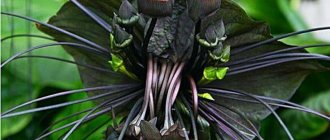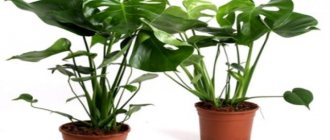In an effort to make their home as cozy as possible, or to turn their apartment in the concrete jungle into a green oasis, women decorate their apartments with all kinds of plants and flowers. But not everyone knows that many of them are not recommended for breeding at home, and some are strictly prohibited. Such plants can poison a pet or seriously harm a baby or adult. Some flowers are not recommended to be kept at home due to various superstitions. We will now tell you which flowers you can’t keep at home and which you can.
- What flowers should not be kept at home: photos of poisonous plants
- What flowers cannot be grown at home: signs and superstitions
- What flowers should you not keep at home according to Feng Shui?
- What plants should a girl not keep at home?
- Indoor flowers: which ones can be kept at home
Poisonous plants that are not recommended to grow at home
We will not be able to list all the indoor plants that are dangerous to humans; this is impossible, since there are a lot of them. Let's dwell on the most popular ones, those that ladies often grow in their homes without fear.
When we buy a flower, we imagine how organically it will look in our interior, how it will lavish its aroma and cause the envy of our girlfriends. But we don’t think about what damage a new green “friend” can cause.
Oleander is a beautiful flower with large bright petals, but the leaves contain poisonous juice. If this juice gets on human skin, it can cause allergic reactions and even burns. Moreover, the aroma of oleander can cause headaches, nausea and fainting.
Dieffenbachia - this plant can be found among many people; it is loved for its large, beautiful leaves, in the bright design of which all shades of green seem to merge. However, not all connoisseurs of the bright appearance of Dieffenbachia know that its juice can also cause burns. If the plant juice gets into the esophagus, severe burns and poisoning cannot be avoided. It is better to forget about this plant for families with small children and animals, especially cats.
Azalea is incredibly beautiful; large caps of its bright colors find fans from all parts of the world. However, azalea leaves contain the most dangerous substances, glycoside and andromedotoxin, contact with which for people and animals will lead to severe poisoning, nausea, and convulsions.
Cyclamen, beloved by many, is also on the list of flowers that cannot be grown at home. Cyclamen flowers look funny, attracting admiring glances from lovers of originality, but distract attention from the dangerous leaves. The leaves of the plant are very toxic, but its tubers are even more dangerous. They contain a poison similar in effect to curare, which if ingested by a person or animal will cause vomiting, diarrhea, severe cramps and even fainting.
Nightshade is a bright flower with a positive appearance and dangerous content. The plant is strewn with juicy orange fruits, but you cannot eat them: they are very poisonous. Once ingested, nightshade fruits can cause serious poisoning. If it is not difficult for an adult to learn that the bright appearance of the fruit is just a lure, it will be difficult for a child to resist tasting the beautiful “berries”.
Trichocereus belongs to the cactus family, as evidenced by its bright appearance. Among the long needles, beautiful large white flowers regularly bloom, which, moreover, smell very tasty. This aroma can cloud your consciousness, because the plant contains hallucinogenic and toxic substances that can cause paralysis of the central nervous system.
Geranium is a very common resident of our window sills. However, some people cannot keep these house flowers at home. Geranium leaves contain a lot of essential oil, so it smells so strong that it can cause an allergic reaction. Many people are familiar with the characteristic smell of geranium, but, as a rule, the aroma is released only after the plant is touched.
Evergreen ivy is very poisonous: dangerous substances are contained in the stems, leaves and berries of the plant. Cats will be especially affected: they are very attracted to the bright green leaves, which they are sure to try.
Oleander
If you have watched the movie “White Oleander”, then you probably know how much evil lurks in this delicate plant: oleander flowers are very poisonous, but their danger does not end there. Even their aroma can cause dizziness, especially if you keep the oleander indoors in winter. Therefore, it is better to replace this flower with something more harmless.
What kind of house flowers should not be kept at home due to signs and superstitions?
There are many superstitions associated with growing flowers at home. Whether to trust them or not is a personal matter for each person, but we will tell you which so-called “unlucky plants” are not recommended to be kept at home due to popular rumor.
According to popular belief, cacti - and not just Trichocereus - should not be kept at home. There is a belief that in a house where cacti grow, the husband may become an alcoholic, and the girl will not be happy in her marriage. Or he will be completely left without a “other half”. It is also believed that cacti negatively affect relationships between family members.
What flowers cannot be grown at home? This is the second time Dieffenbachia has been included in the list; popular rumor attributes to it the ability to “take away” health from family members. Of course, it’s not for nothing that there is so much poison in it.
Sansevieria, or mother-in-law's tongue, is believed that these flowers should not be kept at home by an unmarried woman. The plant, which has practically no stem, but many, many elongated narrow leaves, does not allow men near the house. And if some daredevil gets in his way, his mother-in-law’s tongue will certainly “drive him out.” Therefore, if you grow such a plant on your windowsill, you can remain unmarried. And you certainly shouldn’t keep sansevieria in the bedroom; there is a belief that it negatively affects female strength. Should we believe or not such signs? Probably, if you collect all the folk superstitions in one list, you will have to get rid of all the green inhabitants of the window sills. On the other hand, maybe it’s not for nothing that the flower has a “speaking” name?
What indoor flowers should not be kept at home? It’s not for nothing that the photo of the ficus was included here. This plant not only can cause allergic reactions, but also prevents the appearance of children in the house. In any case, it is believed that if you are planning a child, you first need to get rid of the ficus. At a minimum, ficus should not be kept in the bedroom, otherwise it can harm the relationship of the spouses.
What flowers should not be kept in the house according to Feng Shui?
The Asian practice of organizing space, of course, did not ignore such an interesting point as flowers in the house. Feng Shui “forbids” keeping at home not some varieties of flowers, but plants that are in a certain state.
Thus, it is believed that there is no place for dried flowers at home: they contribute to the drying out of feminine energy. Therefore, ladies who keep dried flowers in the house have nothing to hope for male attention.
It is recommended to get rid of old flowers that have not sprung for a long time. Sick flowers should be removed from the house, as they can “take away” people’s health.
If a flower, despite special care and care, fades, you need to get rid of it. It is believed that it emits negative energy.
You need to choose flowers whose leaves “look” up; they will fill your home with positive energy. Plants with leaves that trail downwards have no place in the house.
You should not have a flower with pointed leaves in your house; it is better to give preference to plants with rounded leaves. Allegedly, these plants will bring scandals and discord to the family.
According to the teachings of Feng Shui, flowers are divided into male and female. Women's: begonia, violet, crassula, cyclamen. Male: dracaena, chlorophytum, citrus. To have positive energy at home, it is necessary to grow both female and male flowers.
Monstera
I don’t know about you, but I personally find it difficult to understand how people come up with the idea of planting such a plant in their home: it was clearly given such a monstrous name for a reason! In addition, there are rumors that monstera sucks energy from sleeping people, due to which its leaves become large and fleshy. By the way, this is why it is recommended to install it in offices: absorbing all the negativity, it creates peace and quiet in the room.
If such stories do not make the right impression on you and you are accustomed to believing only facts, then here they are: monstera juice is truly poisonous and can cause not only swelling, but even conjunctivitis.
What flowers should an unmarried girl not keep at home?
Perhaps this topic is worth special mention, since most of the signs and superstitions associated with flowers relate specifically to marriage and childbirth.
- Lianas and liana-like flowers should be removed from the home by unmarried women. Otherwise you won't be able to get married
- For example, folk superstitions “prohibit” girls from keeping the monstera vine at home, otherwise they can doom themselves to celibacy. Of course, there are no proven facts of such monstera behavior, however, on the Internet you can find reviews from women who report that they managed to improve their personal life only after getting rid of the flower
- The cacti, which we have already talked about, also “turn away” potential suitors from the girl. It’s doubly offensive if you have to break up with your chosen one because of his attachment to drink, and not to the woman he loves.
- Mother-in-law's tongue that drives men out of the house
- Ficus preventing you from having offspring
- Climbing plants, otherwise the man will cheat regularly
Folk signs about indoor plants
Flowering is often associated with income, good luck, and pleasant events on the personal front; withering of plants is considered a bad omen. The exception is the Decembrist - premature or late flowering is considered not the best sign.
Male happiness is a flower that cannot be kept at home
The drying of one plant indicates the removal of a strong evil eye, damage, or serious illness. Mass destruction of crops means the presence of negativity in the apartment or serious damage. Disease and wilting of flowers for natural reasons foreshadows purchases.
If in the middle of winter an inflorescence appears, expected in the summer, something pleasant, and to some extent impossible, will happen. The interpretation is determined by the properties of the culture (the flowering of the money tree out of season means unexpected income).
Important! In Islam, it is forbidden to give plants in flowerpots; the gift threatens failure for the giver and the recipient; when receiving the pot, a coin of any denomination must be given in return. This way the gift will turn into a pleasant purchase.
Plants and superstitions
What flowers can you keep at home?
Here is a list of plants that should bring happiness and prosperity to your home:
- Money tree - the name speaks for itself. It is better to plant it yourself, placing a coin on the bottom of the pot. But if the leaves of the money tree dry out, you need to get rid of the flower
- Lemons increase activity
- Dracaena in the home promotes well-being and career growth
- The spitaphyllum flower should be placed at home for unmarried women. It will help you find your chosen one, and in established families it promotes peace and happiness
- Akucuba, or the golden tree, will help you get rich, develop your talents and protect you from ill-wishers
Of course, you shouldn’t recklessly rely on these lists - which flowers you can keep at home and which you can’t. Whether it is worth urgently throwing away your many years of herbarium collection, or giving a ficus to your sworn friend, everyone decides for themselves.
If a person believes in omens, there is no need to grow, for example, ferns at home, this will at least have a negative impact on the subconscious. If you treat folk signs skeptically, without attaching importance to superstitions, then your husband is unlikely to become an alcoholic just because there are cacti on the windowsill.
Orchid
Not so long ago, an orchid was considered something rare and exotic, but now it is often grown right on the windowsill, creating real mini-orchid gardens. If, as you read this, you look in horror at your impressive collection, let us reassure you: orchids are not poisonous! But they can cause dizziness and even headaches in people who are especially sensitive to odors. Keep this in mind when filling your bedroom space with beautiful pots.











